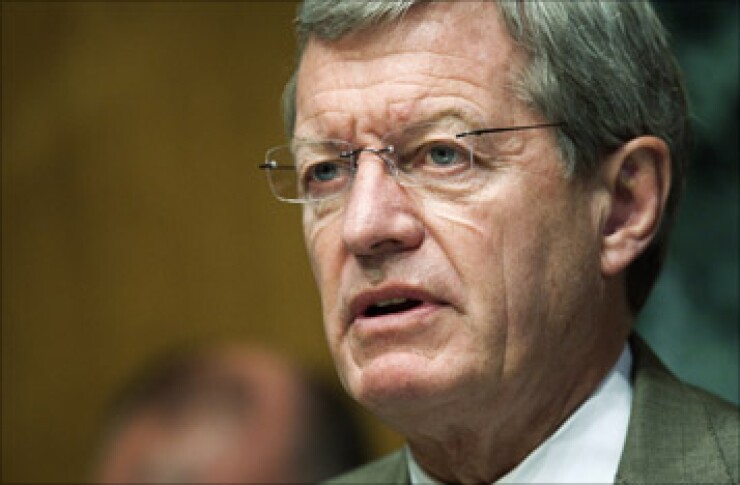
WASHINGTON — Municipal bond market participants, on guard against proposals to limit or eliminate the tax exemption, doubt 2014 will bring comprehensive tax reform.
Movement will be slowed not only by political gridlock, they say, but also by changes in leadership in the House and Senate tax-writing committees. President Obama intends to nominate Senate Finance Committee Chairman Max Baucus, D-Mont. to become ambassador to China. And House Ways and Means Committee chairman Dave Camp, R-Mich., in his last year of his term as chair in 2014, is unlikely to receive a waiver from term limits to continue to hold the job. Rep. Paul Ryan, R-Wis., chairman of the House Budget Committee, has already said he would like to take over leadership of the tax committee.
The timeline of Baucus' confirmation to the ambassador post is unclear. Baucus had previously announced that he was not going to seek re-election in 2014, and the impending ambassadorship means he'll likely leave the Senate before the end of the year.
Click
Baucus released a few tax-reform discussion drafts in the past several weeks that focus on non-muni specific areas of the tax code. He may release a discussion draft about infrastructure tax reform in January, which could include bond-related provisions.
Whenever he leaves, most sources think Sen. Ron Wyden, D-Ore., is most likely to replace him as chairman of the Senate Finance Committee. It is unclear whether Wyden would take the same approach to tax reform as Baucus.
The likely early change in leadership may be a setback to tax reform in the Senate in the short run.
"It has the potential to slow the process," said Michael Decker, Securities Industry and Financial Markets Association managing director and co-head of municipal securities.
Since Baucus has been a leading supporter of tax reform among Democrats, "his early departure does not bode well for a bipartisan effort next year," said Matt Fabian, a managing director at Municipal Market Advisors.
But Chuck Samuels, an attorney at Mintz Levin, said he thinks that Wyden's ascendency to the chairman position is "probably a boost for tax reform," because Wyden is more aggressive than Baucus.
Micah Green, a partner at Patton Boggs and the former president and co-chief executive officer of SIFMA, thinks the change in Senate leadership could make it more difficult to move tax reform in 2014 but noted that "Ron Wyden happens to be a tax reformer."
However, Wyden has scared the muni market by introducing bills that would change the exemption for interest on municipal bonds to a traditional tax credit.
Susan Collet, senior vice president of government relations for the Bond Dealers of America, said that "it will remain to be seen where as chairman he will come out on certain issues."
Decker said Wyden has previously supported direct-pay bonds, and that it is unclear if Wyden is committed to tax-credit bonds or if what he really wants are more direct-pay bonds. Wyden is well aware of Republican opposition to direct-pay bonds and has indicated that he hasn't tried to resurrect Build America Bonds because the legislation would not go anywhere.
Direct-pay bonds, while not a viable substitute for tax-exempt bonds, would be a good supplement to them, Decker said. But there is a consensus in the market that tax credit bonds are not really "a viable financing tool" because "there are a lot of inefficiencies associated with tax-credit financing," he said.
Bill Daly, director of governmental affairs for the National Association of Bond Lawyers, said Wyden "clearly is interested in [tax reform] and it will clearly move forward," although it is uncertain what form tax reform efforts will take and how far forward reform will move.
With Camp in his last year as Ways and Means Committee chairman in 2014, he is going to be interested in proceeding with tax-reform efforts and may even introduce a bill, Capitol Hill-watchers said. Ryan said on Meet the Press that Ways and Means Committee members are interested in advancing tax reform legislation in the first quarter of 2014.
But while market participants think they'll be some movement on tax reform in 2014, the chances that reform will actually be enacted are slim.
Hurdles Ahead
Decker said there will be hurdles with moving bills through the House and Senate, reconciling versions of the bills and getting presidential approval. A big disagreement between the two chambers is whether tax reform should be revenue neutral or revenue raising.
The fact that 2014 is a midterm election year also makes enacting tax-reform legislation in the next 12 months more challenging, according to market participants.
"Politicians will talk endlessly about the need for tax reform, but actually approving it means assigning winners and losers while working together with sworn partisan enemies," Fabian told The Bond Buyer. "That is not something easily done ahead of yet another contentious election cycle."
Municipal bond market participants should continue to urge members of Congress to preserve the tax-exemption for munis, market participants agree.
Samuels said the budget agreement that maintains the sequester for direct-pay bonds through 2021 and extends it through 2023 should be "a rallying symbol for people to keep the advocacy up."
Decker said it would be hard for Camp to achieve his objective of lowering the top rate to 25% while keeping tax reform revenue and distributionally neutral without cutting back on tax preferences, including the exemption for municipal bond interest.
"I think this just has to be a factor," he said. "The math doesn't work otherwise."
Frank Shafroth, director of the Center for State and Local Government Leadership at George Mason University, said that two potential wild cards for tax reform in 2014 are the budget resolution for fiscal 2015, which may include instructions for tax reform, and the need for another debt ceiling increase, which may spur discussion of taxes. .
Most market participants think President Obama will continue to include a 28% cap on the value of the tax-exemption for munis in his fiscal 2015 budget, which is supposed to be released in February. They also expect the president to once again propose America Fast Forward bonds, direct-pay bonds that could be used to finance a range of projects, including those eligible for private-activity bond financing.
"The administration has expressed a strong commitment" to those proposals, Decker said.
Shafroth said Obama might include in his budget something different "that will raise greater complications and maybe more restrictions" than the 28% cap. The president has recently put an emphasis on addressing income inequality, and there's been a perception that munis only benefit the wealthy, he said.
In addition to monitoring how any tax-reform proposals would affect munis, the National Governors Association is watching to see if there would be any change to the deduction of state and local taxes. "We're watching both of those issues very closely," NGA deputy director of policy David Quam said, noting that doing away with this deduction would essentially raise the cost of state and local taxes.
Collet said thinks that, separate from tax reform, there could be forthcoming bills or proposals about a new Build America Bond program that would be immune from sequestration.
Democrats generally want to do some kind of economic stimulus, and bonds tend to be in those types of proposals. However, it may be a challenge to figure out how to pay for stimulus programs, and there might need to be a significant bargain between Democrats and Republicans in order for a stimulus bill to pass, Collet said.
The Debt Ceiling
Congress will also have to address the debt ceiling again in 2014. Legislation passed in October suspended the debt ceiling through Feb. 7. The Treasury is once again expected to engage in extraordinary measures so that the U.S. can continue to pay its obligations in the short-term.
Treasury Secretary Jack Lew told Congress in Dec. 19 letter that by using extraordinary measures, the department could extend the nation's borrowing authority until late February or early March.
Daly said that it's a "reasonably good bet" that the window for state and local government series securities (SLGS) will close on or before Feb. 7. Issuers buy SLGS from the Treasury for their advance refunding escrows to avoid violating yield restriction requirements. The maturities of SLGS can be tailored to match the maturities of the refunding bonds so the investment does not exceed the bond yield.
Daly added that it unclear what Republicans in Congress will ask for in exchange for passing a debt limit increase.
Fabian said that the Republicans were "burned with the government shutdown," so to the extent that the debt ceiling has to be addressed, "I think it will be less confrontational ahead of the midterms."
Utah State Treasurer and incoming National Association of State Treasurers President Richard Ellis said that if a debt ceiling fight occurs around primary season or around the time of the general election, there could be problems for incumbents in Congress.
"I think midterm elections will be something interesting to watch," he said. He suspects that there will be "not quite as much grandstanding" among members of Congress.
Marketplace Fairness Act
Another issue that experts will be paying attention to in 2014 is internet sales tax legislation.
In May, the Senate passed the Marketplace Fairness Act, which would allow states to compel out-of-state online retailers to collect sales taxes. In September, House Judiciary Committee Chairman Rep. Bob Goodlatte, R-Va., released principles on what he would like to see in online sales tax legislation.
"The House is primed to take that up," Quam said.
A few weeks ago, the Supreme Court declined to hear challenges from Amazon and Overstock to New York's internet sales tax law. By doing so, the court essentially said that the issue of taxing online purchases is up to Congress to handle, Shafroth said.
Shafroth also said that Goodlatte will feel pressure from voters in his district to move forward with legislation.
"The issue is, does the Congressman want to serve his constituents," Shafroth said.





